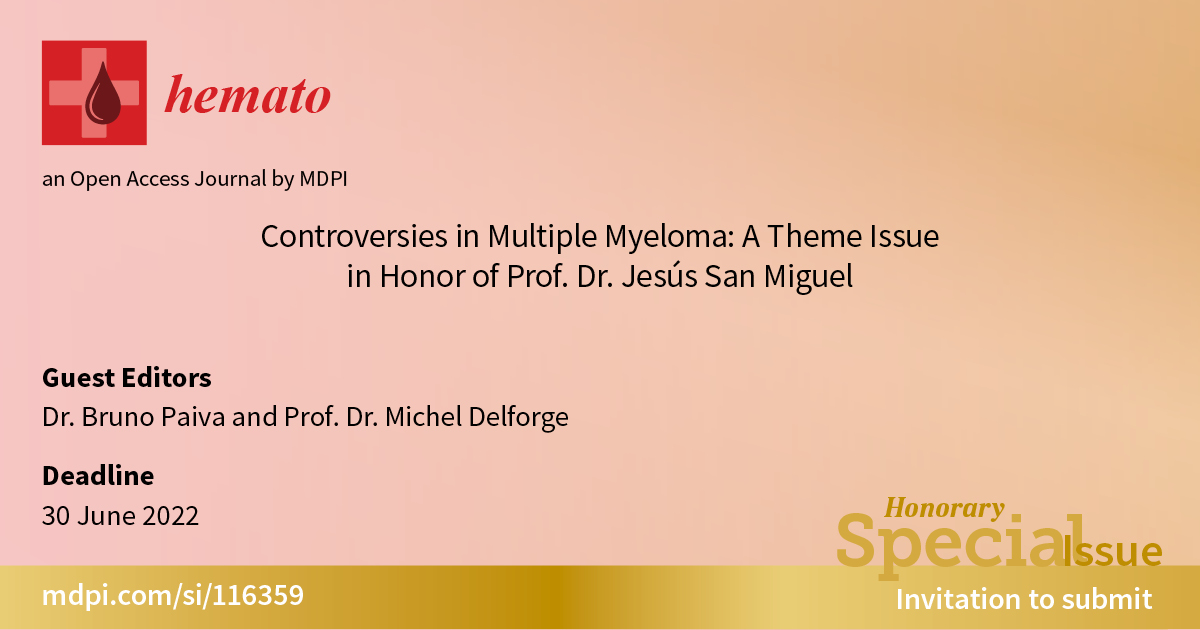Controversies in Multiple Myeloma: A Theme Issue in Honor of Prof. Dr. Jesús San Miguel
A special issue of Hemato (ISSN 2673-6357). This special issue belongs to the section "Plasma Cell Disorders".
Deadline for manuscript submissions: closed (31 March 2024) | Viewed by 13766

Special Issue Editors
Interests: multiple myeloma; amyloidosis; Waldenström's Macroglobulinemia; acute myeloid leukemia; minimal residual disease; circulating tumor cells; flow cytometry
Special Issue Information
Dear Colleagues,
This Special Issue aims to honor Prof. Jesús San Miguel his outstanding scientific and clinical contributions in the field of multiple myeloma. His ability to integrate the clinic and the bench on a translational research model to serve patients was fueled since the beginning of his career by his mentor, Antonio López Borrasca. Since then, he has devoted his life to improving diagnosis, treatment and monitoring of patients with monoclonal gammopathies, and to train >40 Hematologists and >30 PhD students and instill in them his dream of curing hematological malignancies such as multiple myeloma. Prof. San Miguel is the author of nearly 1,000 manuscripts, and his contributions range from the i) leadership in pivotal studies that led to the approval of five therapies in multiple myeloma, ii) introducing the concept of early detection and intervention in smouldering myeloma and MRD states, iii) establishment of centralized cores for diagnosis and monitoring that have benefited >10,000 patients with hematological malignancies; iv) generating national and international cooperative groups and networks; and, v) passionate, committed service to the medical community and patients through the participation on domestic and international committees and commissions, as well as the generation of >20 guidelines and consensus documents on diagnosis, classification and treatment. One of Prof. San Miguel his unique personal features is that he cares profoundly about his colleagues and his main aim is to try to help others around him; that is why he is more than a myeloma expert, he is a respected personality and a friend for most of the members of the myeloma community.
This Special Issue covers several important but still controversial topics in the field of multiple myeloma including the management of high-risk smouldering myeloma, the role of prognostic and predictive factors of autologous stem cell transplantation. In addition, the increasing role of MRD, novel therapeutic agents like CAR-T and bispecific antibodies, the management of frail elderly patients and the road towards a cure in myeloma are discussed. The papers are written by world-leading experts in the field who are, last but not least, also good friends of Prof San Miguel.
Dr. Bruno Paiva
Prof. Dr. Michel Delforge
Guest Editors
Manuscript Submission Information
Manuscripts should be submitted online at www.mdpi.com by registering and logging in to this website. Once you are registered, click here to go to the submission form. Manuscripts can be submitted until the deadline. All submissions that pass pre-check are peer-reviewed. Accepted papers will be published continuously in the journal (as soon as accepted) and will be listed together on the special issue website. Research articles, review articles as well as short communications are invited. For planned papers, a title and short abstract (about 250 words) can be sent to the Editorial Office for assessment.
Submitted manuscripts should not have been published previously, nor be under consideration for publication elsewhere (except conference proceedings papers). All manuscripts are thoroughly refereed through a single-blind peer-review process. A guide for authors and other relevant information for submission of manuscripts is available on the Instructions for Authors page. Hemato is an international peer-reviewed open access quarterly journal published by MDPI.
Please visit the Instructions for Authors page before submitting a manuscript. The Article Processing Charge (APC) for publication in this open access journal is 1200 CHF (Swiss Francs). Submitted papers should be well formatted and use good English. Authors may use MDPI's English editing service prior to publication or during author revisions.
Keywords
- multiple myeloma
- smouldering multiple myeloma
- prognostic factors
- autologous stem cell transplantation
- minimal residual disease
- frailty
- CAR-T and bispecific antibodies
- cure
Benefits of Publishing in a Special Issue
- Ease of navigation: Grouping papers by topic helps scholars navigate broad scope journals more efficiently.
- Greater discoverability: Special Issues support the reach and impact of scientific research. Articles in Special Issues are more discoverable and cited more frequently.
- Expansion of research network: Special Issues facilitate connections among authors, fostering scientific collaborations.
- External promotion: Articles in Special Issues are often promoted through the journal's social media, increasing their visibility.
- Reprint: MDPI Books provides the opportunity to republish successful Special Issues in book format, both online and in print.
Further information on MDPI's Special Issue policies can be found here.






